Melford Vincent: Kick the notion that two things don’t go together
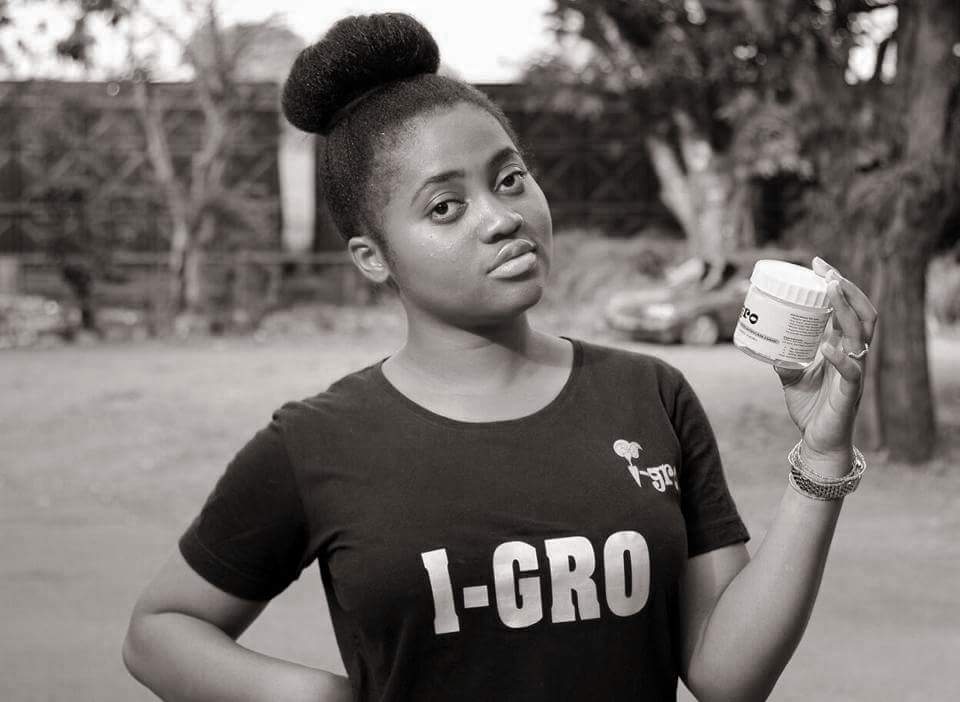
[bctt tweet=”I have great aspirations for my brand & I hope to see it throughout Africa” username=”SheLeadsAfrica”] There is nothing as gorgeous as having glowing melanin with the kink and curls that come with it. Yes, I’m talking about the beauty of African hair. Most of us however, feel compelled to straighten our hair so that we fit in easily. While doing up our hair and getting extensions is not a bad thing, all I’m saying is that it’s still important to maintain that natural and just be naturally unbothered! Melford Vincent a 21-year-old Sierra Leonean lady who is pursuing a degree in Law struggled with badly damaged hair for a long time. She had a hard time with it but through extensive research, she finally found the most effective herbal remedy for African hair. Melford formulated this herbal hair remedy into the I-GRO hair recipe that works wonders for African hair. It helps with hair moisture and the acceleration of hair growth. I-GRO ingredients are all acquired locally from the markets of Sierra Leone and currently it’s one of the main brands leading in the hair community of her country. This is evident in the young women, children and young men that are getting hair breakthroughs through its use. Unbelievably this young #Motherland Mogul started her business with less than $10, making just a few for friends and using the little profits to produce more. To date Melford has made over a thousand products, developed her brand through her smartphone and notepad and now she is looking into hiring staff. I had the opportunity to talk to this goal getter and this is what she had to say. Why do you think the natural hair community is small in Sierra Leone? The natural hair community in Sierra Leone is a small one but it keeps growing from time to time. Most Sierra Leonean Women don’t practice safe hair practices they prefer throwing on a wig or other hair extensions, so they see little or no need to care for their natural hair underneath. Most of us have been conditioned to believe that natural hair is bad and need to be tamed with relaxers. How long do you think it will take to convince the African woman to embrace the texture of their natural hair? I think with the growing trend of the natural hair movement, most African women are coming to terms with it and embracing their natural hair, although some may need extensive schooling and persuasion so as to even give going natural a thought. There are quite a number of hair products for African hair and most women have been disappointed by most of the results. How do you assure someone who has never used l-GRO that it’s different? Through experience, most of the products allegedly made to cater for African hair needs don’t necessarily work for African hair effectively. Reason being that in most cases the African climate was not in mind when these products were formulated. The African climate is a harsh one, with excessive heat, humidity and dry winds in the harmattan, I-GRO bridges that gap. It was formulated, to perform perfectly in an African climate, balancing the hair moisture and not leaving a greasy feeling. The product likewise works for other climates and colder weathers because of its potency. There are over a hundred people talking about your product on Facebook. What are your strategies to multiply this number? I-GRO is fast becoming the most sought after hair solution in Sierra Leone and it has also been spreading to neighboring countries like Liberia , Guinea, Ghana, Nigeria etc. I am working daily to develop my social media following, which is growing substantially daily. How do you manage your time since you are a student and at the same time you run your business? I am still trying to find a balance, as it is actually not easy. For now I make sure I manage my time well. I don’t procrastinate. And I make sure to produce a lot of products at a time so I don’t have to be doing it every now and then. I am thinking of hiring as the business is fast becoming too big for me to handle alone. [bctt tweet=”Melford Vincent says, There’s nothing wrong in starting small.” username=”SheLeadsAfrica”] What advice would you give a young you? I would tell them, to kick the notion that two things don’t go together. They sure do, and you can start building your dream, no matter how old you are. There’s nothing wrong in starting small, you don’t need to break the bank to start a business. I started mine with less than $10. If you’d like to share your story with She Leads Africa, let us know more about you and your story here.
Michelle Orlendo: Helping women appreciate African-textured hair with the Nywele Chronicles
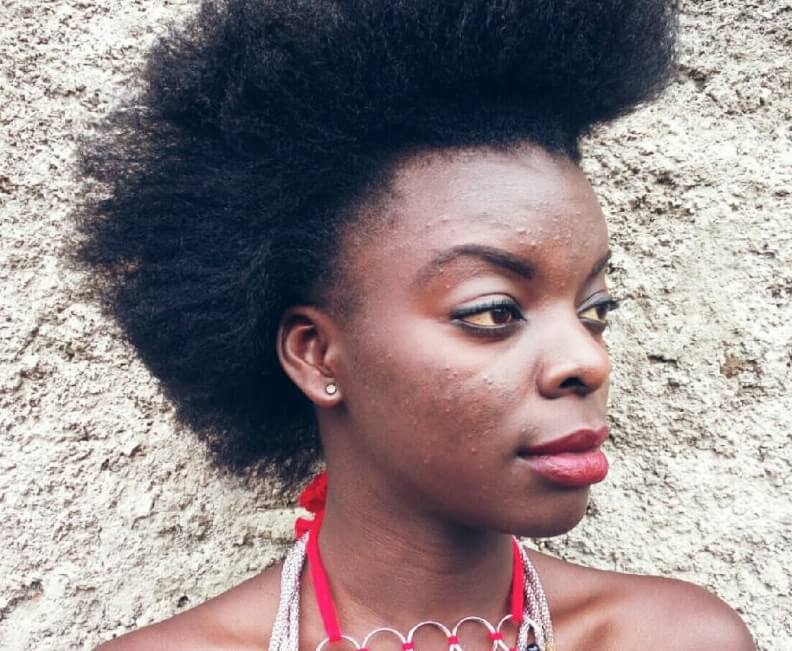
[bctt tweet=”There is no harm in trying. Do not be afraid of failure, keep trying – Michelle Orlendo” username=”SheLeadsAfrica”] Natural hair, especially 4c textured hair, styled in a simple yet luxuriant look has been frowned upon by many. We often hear people classifying it as an unkempt and unruly look. However, Michelle Orlendo, is changing that perception daily one head at a time. Michelle is seeing to it that as many women in Kenya transition and embrace the beautiful and natural look as possible. Tired of chemically and heat treating her hair, which had lost volume, and inspired by the fact that African women were rocking their natural hair and slaying, the 23-year-old Michelle woman embarked on a journey of being a naturalista. The big chop Michelle Orlendo went for the big chop in July 2015, to the chagrin of many. She had shoulder-length, flowing heat-treated hair, an ideal look for many. As she began her journey slightly over a year ago (on 25th November, 2015), Michelle vowed to involve other women. She especially targeted young girls who would aspire to go natural but lacked the motivation and/or guidance. The journey ahead was full of trials, criticism, moments of almost giving up and a lot of doubts. However, it began with the opening of a Facebook page dubbed “Nywele Chronicles”, (Nywele is hair in Swahili). Michelle invited her friends to like the page initially. Only a few liked it, but the fan base gradually picked up through her consistency in giving what the audience wants. The Nywele effect A few months after her big chop, Michelle’s hair grew tremendously and ladies started asking questions. Michelle describes her hair as a reflection of her soul, and her hair was glossy and really kinky —in every sense of African amazing kinky. Questions came pouring in, people wanted to know what Michelle applies, how she styles it and protective styles they could use. With every question came the realisation that she could start a blog. Michelle thought to move away from only posting pictures on her social media platforms, but also write reviews of the products she used and how she styled her hair. From it’s inception, Nywele Chronicles gained a huge amount of followers who genuinely wanted a smooth transition from chemically treated hair to natural hair. Michelle became a hair consultant of some sort. Ladies would approach her to feel her hair and request her to cater to theirs the same way. Her glorious mane turned heads in school, Moi University, as people started calling her by her page’s name, Nywele Chronicles. “It has not been an easy journey to keep my focus on updating my social media pages, getting the time to do tutorials amongst other things.” Michelle says. “I’d have given up were it not for my passion and the strong support system I have.” This is how Michelle Orlendo persevered through the challenges to get to the one year mark. Aiming to encourage women to love their natural hair Michelle hopes to have her own products that cater to African-textured hair in the market, in a span of less than 5 years. With a salon to her name and a degree in Trichology —a branch of dermatology that deals with the scientific study of the health of hair and scalp— a consultancy will come in handy. With her experience, Michelle always looks at people’s hair and analyses it even before touching. She can easily tell hair that lacks moisture, too much heat treatment and malnourished hair. [bctt tweet=”Michelle Orlendo stays motivated by the fact that Nywele Chronicles will soon be a business” username=”SheLeadsAfrica”] Now in her final year studying Actuarial Science, Michelle Orlendo stays motivated by the fact that she will soon be turning Nywele Chronicles into a business. Aiming to encourage women to love their natural hair is her tag line. This is being actualised as Michelle is helping transitioning women to wear their natural look, and feel glamorous while at it, through Nywele Chronicles. She further adds that the initiative has really helped build her confidence and esteem. Going natural has made Michelle appreciate herself holistically and opened a new window through which she views herself. To everyone that wants to venture in the formally perceived ‘not-so ideal’ courses and activities Michelle Orlendo says; “If you feel like the timing is right to do anything that you want to do, go ahead and do it. Forget what people will say and do it. There is no harm in trying. Do not be afraid of failure, keep trying.” Want to see women you know featured on SLA? Tell us what amazing things women are doing in your communities here.
Hanani Dube: Running a business is one of the most difficult things I’ve had to do
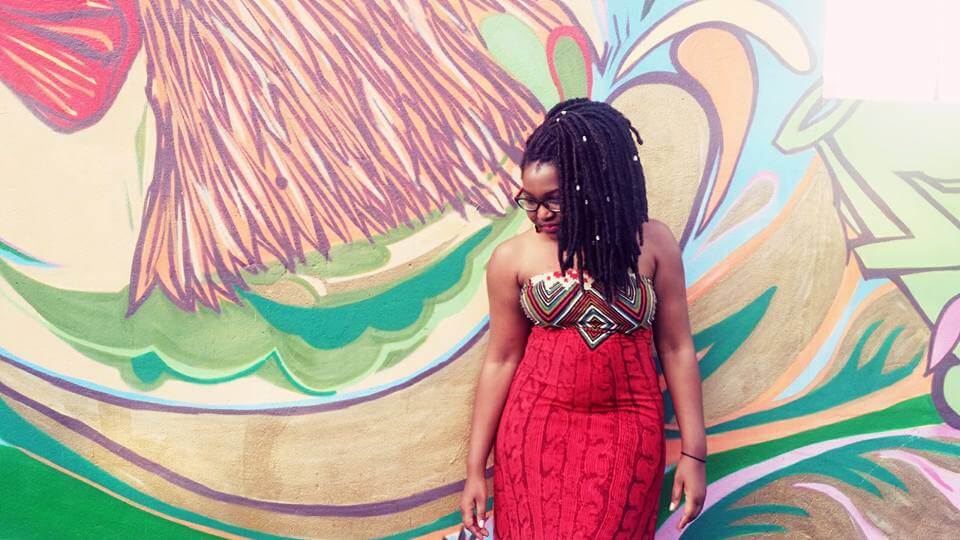
[bctt tweet=”Hanani Dube is a fusion of many things but all her experience has lead her to @FroSisterHanani” username=”SheLeadsAfrica”] Some may say that the natural hair and skincare market has been inundated but Hanani Dube would disagree. Hanani is fusing her degrees in food chemistry and business in her brand FroSister. You can easily tell by her range of hair butters in a variety of “flavours” such as vanilla ice-cream, avocado and sweet almond. In this interview with SLA contributor Dalphine, Hanani Dube shares what makes her FroSister stand out from the competition. Hanani please tell us briefly about who you are, I am sure people would love to know more about Frosister. It is quite difficult to describe myself as I am a fusion of so many things. I am an academic. I studied food chemistry for my first degree and business and HR for my second but I’m also a creative at heart. I managed to fuse together my love for business, food chemistry and natural hair by creating FroSister natural hair and skincare products. When I created the product range, natural hair products were difficult to find in stores and online . Any challenges you have encountered in ensuring your products’ success? There are so many, running a business is one of the most difficult things I have had to do. One of the main challenges is the actual start. People always have great ideas and a vision but when it comes to the action part, lots of people procrastinate and fear sets in. Overcoming fear is a challenge to most. Once you start, you will find that a way is always paved. How do you manage competing with established hair care brands and ensuring brand loyalty amongst your customers? I don’t think its competition, I believe that what I bring to the table is fresh. FroSister is targeted to a completely new target audience. My customers love their natural hair and want a higher quality product which works. Which countries and fashion retail stores have stocked up your brand? Our products can be found in the UK, Zimbabwe and the US. They can be found in independent retailers, wholesalers, as well as hair salons. 2017 will start with our launch in South Africa and Ghana. We also will be launching our FroSister Ambassador Program. [bctt tweet=”Hanani Dube is bringing something fresh to the table with her natural hair and skincare products” username=”SheLeadsAfrica”] Growing up, did you once imagine that you would take over the hair care industry and have your own brand retailing world over? It was something that I aspired to do. I remember when I was 10, I saw an advert of a skincare brand and it just clicked. I immediately told my mum that when I grow up, I want to own a company like this. However as I grew up, I totally forgot about the dream and went on to do food chemistry and nutritional science followed by my Masters in Business. Little did I know that all this would lead to the start of the brand FroSister. So you have to speak it into your life. Aspiring #MotherlandMoguls (like me) out there are dying to know how you balance your family and business life It is such a difficult task. You need to be highly organized with everything, planning a month and even a year ahead for the larger projects. You also need to have a supportive family who understand your goals. Also, don’t be afraid to ask for help. So who, or rather what motivates Hanani? My children motivate me. I want to show them that anyone can make their dreams a reality with hard work, preparation and dedication regardless of their gender age or where they come from. [bctt tweet=”Hanani Dube: You have to speak it into your life. You are more powerful that you know” username=”SheLeadsAfrica”] Any words of encouragement? If you have a dream, don’t allow anyone to tell you that you can’t. You are more powerful that you know. Faith, focus, determination, preparation and hard work are the ingredients. You also have to love what you do and believe in yourself. Always remember you are beautiful just the way you are. Want to see women you know featured on SLA? Tell us what amazing things women are doing in your communities here.
Michelle Ntalami: Entrepreneurs have a fire
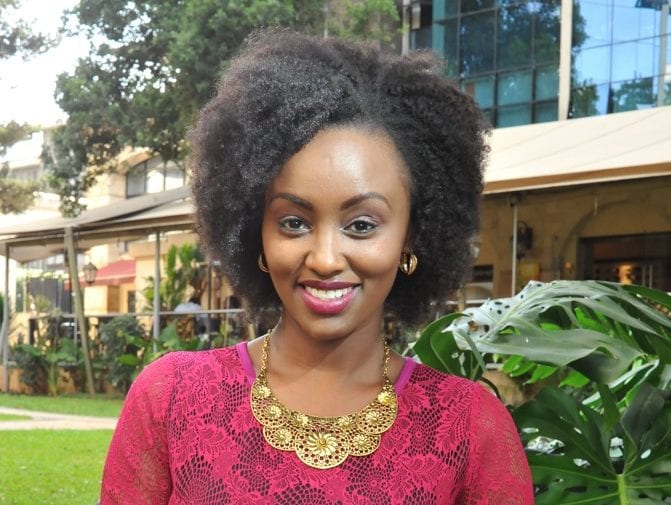
[bctt tweet=”Cosmetic scientists told @MichelleNtalami that the African natural hair market isn’t quite ready” username=”SheLeadsAfrica”] Michelle Ntalami, a strategic brand and marketing expert, is the founder of Marini Naturals, Kenya’s first 100% organic, natural hair care line. With her wealth of branding and design knowledge, she has conceptualised and designed the Marini Naturals brand, from its name to its logo, colours, scents, packaging, label design, brand plan and marketing strategy. Here, Michelle discusses her fruitful journey to creating Marini Naturals. Marini is Swahili for ‘beautiful’ or ‘attractive’. What was your inspiration behind the name Marini Naturals? From the get-go, I wanted the name to mean “gorgeous” or “naturally beautiful,” just like women are intended to be! I also wanted something very African-sounding and easy on the tongue and mind. So I Googled how many other ways to say “beautiful” or “charming” in any African language. I didn’t mind the language, so long as it was African. And right there was the name “Marini” which is Swahili for the same. I instantly fell in love with it. Marini Naturals is Kenyan’s first 100% natural hair product company for natural hair. How did you find and convince the scientists and other experts who helped turn your dream into a reality? In fact, when I approached a few cosmetic scientists, most told me that the natural hair and skin market is not quite ready in Africa. They advised me to go for generic, synthetic products which “sell more and have higher margins.” But I had a set focus and vision in mind, and to me it was producing 100% natural products with no compromise on quality. However, a few formulators and one factory believed and shared in my vision, and the rest followed. We worked together to make Marini a reality. Soon after our first batch hit the markets and flew off the shelves, most of the ones who had convinced me otherwise expressed interest in working with us. How do you strike a balance between running your branding company, Brandvine Group, and Marini Naturals simultaneously? I have got a team of 10 employees who work on both Marini Naturals and Brandvine Group. Brandvine is mainly run by my partner Niyati Patel, with her team of 8 who manage it very efficiently. I do not want to spread myself too thin, therefore my focus now is more on Marini Naturals. Your team of 10 is within the same age range as you. Was this a deliberate decision on your part, and if so, what are the pros and cons of working with people within your age bracket? Yes, it was. I wanted a young, vibrant and energetic team. I knew there was going to be a lot of running around, fieldwork and logistical work. Therefore I needed employees with that same kind of energy and vibrancy to roll up their sleeves and get their hands dirty, so to speak. I led by example in the first few months. Today, they are the ones on the ground making things happen. [bctt tweet=”@MichelleNtalami wanted a young, vibrant and energetic team so hired people her age” username=”SheLeadsAfrica”] If you had the ear of your president, what would be your advice to him about financing start-ups? Great question. I would tell him to have a serious sit-down with banks to encourage them to believe in young entrepreneurs. Entrepreneurs have a fire and a passion like no one else does because they have their entire future ahead of them and the determination to make it is ten-fold. I’d tell him to them to help us realise our business ideas, rather than shut the doors on our face at the mention of supporting our start-ups. What’s the biggest hurdle currently facing Marini Naturals? We have all these plans to expand our product range but capital stifles us. Additionally, meeting the demand both from Kenya and off-shore markets is quite challenging. As much as we have systems in place to alert us on re-order levels, the fact that sales have picked up pretty well always makes it a balance of how fast we can manufacture before the next Curling Gel runs out. [bctt tweet=”@MichelleNtalami is building Marini Naturals to be one of Africa’s premier beauty products” username=”SheLeadsAfrica”] What does the future hold for Marini Naturals? The future looks bright! We just got featured on CNN, and after the show a lot of Africans reached out to us to find out how they can get our products. We have solid plans to slowly expand to the rest of Africa. Also, we’re considering exciting new products from Marini Naturals. We believe men, kids and even our dreadlocked brothers and sisters need to be taken care of too! There has been a lot of demand from these markets and we are working on something fantastic for them. We hope for this brand to slowly and steadily be one of Africa’s premier beauty products for natural hair and skin. If you’d like to share your story with She Leads Africa, let us know more about you and your story here.
Pretoria Girls High School: 5 lessons I learned from African girls fighting for their Afros
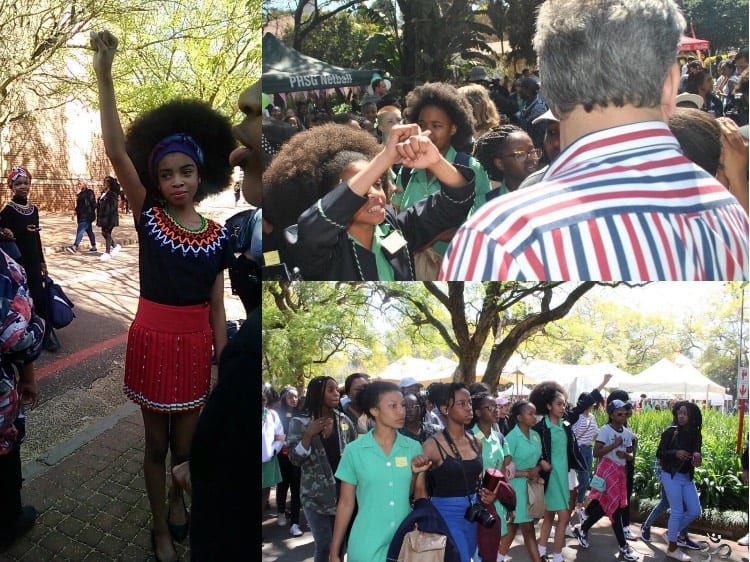
If you have not been living under a rock, you must have heard about the news that ruled the headlines last month. A group of girls in South Africa —who we would all like to adopt into our #SquadGoals— protested against their school for the subliminal and direct ways that they were being racist towards them. The subject in question was their natural hair. As an African living in the US, this trending topic about how unprofessional and untamed natural hair is, is not new to me. Growing up in Ghana, I had heard all the “hair is distracting” arguments. This is why most African girls rocked bald cuts for most of our childhood. What was news to me however, was someone telling African children that their natural hair was unnatural. There is a difference between distracting and unnatural. It’s like going to a school in London and telling the school children that their natural British accents were unnatural. From rocking a bald cut, to having permed strands to now growing kinky curls, I have experienced all the angles on the subject of ‘African Hair’. These are the 5 thoughts I had as I marvelled at the girls from Pretoria Girls High School. Stop telling us what to do with OUR hair Whether permed or kinky, whether braided or dreaded…African women know what they want to do to their hair. And we don’t need your two cents. If African women have to defend their hair everywhere else, should Africa be one of those places? When I heard this story in the news, the first question I had was “Where can we stand?” African features have been under attack since long before we can all remember. From our broader nose to our bigger lips. And now our hair. The fact that African features was being attacked in Africa of all places was unbelievable to me. I felt insulted, that this fight had found its way into our backyard. Are Africans not supposed to find a safe haven in their home? Representation matters I immediately thought of Sarafina when I saw Zulaikha Patel fighting with her fist up for what she believed in. African Americans and other minorities in America, fight every day to be represented respectfully in film, culture and the arts….so should African children not be represented in Africa where they belong home? We should not be denied the freedom of seeing people who look just like us and with hair just like ours. It warms my heart to know that almost thirty years after the movie Sarafina came out, these girls in Pretoria where able to draw the same kind of strength to stand up for what they believed in. Don’t tell us how to fight the issues that only affect us Don’t you love it when the people who are least affected by an issue tell the people most affected by the issue how to cope. (Looking at you, #AllLivesMatter). The problem with telling young girls to ignore the racial issues going on in their schools is that we neglect the fact that they will have to still deal with these same issue when their future employers are telling them their Afro is unprofessional. Problem #2 with the statement in the image above: How do you expect black girls to excel academically if they have to deal with the mental chains of society telling them that their blackness is unnatural? We are strong but we are tired of defending ourselves We are tired of defending our darker skin. Tired of explaining why saying “You are pretty for a dark skin girl” is not a compliment. Tired of hearing the snide comments about how our hair would be more manageable if it was straighter. Tired of hearing how the traits that are most natural to us are somehow unnatural. Teach girls to fight The future of Africa lies in the people who dare to fight for it….and the girls in Pretoria Girls High School fighting for their Afros are all kinds of #goals. These girls came together to raise their voices and change the dialogue in the culture. These girls stood up and peacefully protested. They got made the world listen. They captured the attention of world leaders, all because they decided to be girls who fight. Girls need to be taught that they too have the power to fight for a good cause. Fighting to change the world is not just an exclusive club for Nelson Mandela and other men. African girls can change the world if they will only fight.
“Your natural hair makes you look unkempt”
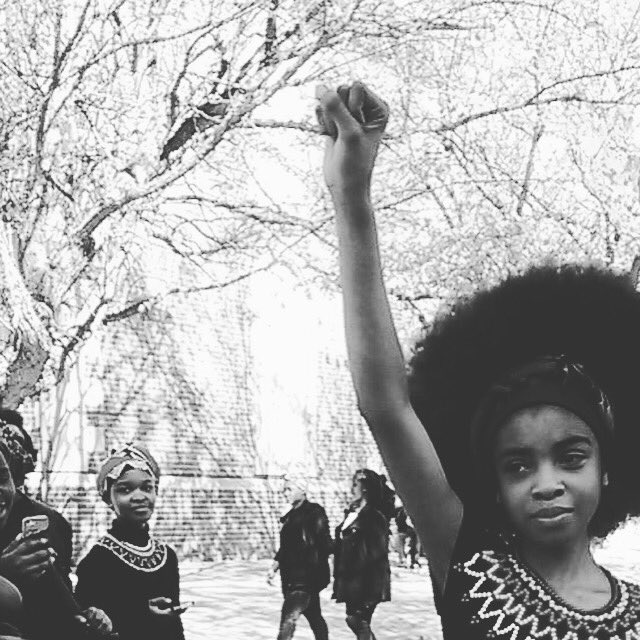
In case you haven’t heard, something amazing happened in South Africa. Just recently, the pupils of Pretoria Girls High protested over subliminal racist rules at the school. Apparently, the school basically told these young girls that their natural hair and Afros make their uniform look “unkempt”. In a world where black women and girls continue to defy the odds and accomplish feats in business and career, our hair cannot continue to define us. It’s been a decade since India Arie reminded us that we are not our hair. Yes, we understand that typically, our natural hair is incredibly thick. We know it is lush, ravishing, gorgeous and most likely, voluminous. We also understand that our hair does not lie flat like straight hair. In a society that associates hair that is straight or has loose curls as ”tidy”, we obviously don’t fit. Yet, having natural hair should never be a crime and it’s high time we (Africans included!) stopped hating on natural hair. I mean, what’s wrong with deciding to wear your hair without a relaxer? When will the world understand that all hair is equal? Healthy hair can be natural, straightened, coloured or chemically treated! Back to the issue at Pretoria, the students have also claimed that the rules in place don’t allow them wear inherently Black hairstyles. They are not to wear Bantu knots, braids, dreadlocks too! News of protests from the students against the school’s arbitrary rules have gone viral. A petition titled, ‘Stop Racism at Pretoria Girls High’ that has garnered over 14,000 asks that; – The school’s code of conduct does not discriminate against black and Muslim girls; – Disciplinary action against teachers and other staff members implementing any racist policy and/or racist actions – Protection for the learners who protested to ensure they will not be victimized. Meanwhile, the hashtag #StopRacismAtPretoriaGirls has been trending on Twitter. This message from a teacher to a parent takes the cake: Let’s hear what you think about the natural hair debate. Should the way you keep your hair define you? Should educational institutions have the power to decide how girls keep their hair?
Dorinda Mawuenya Matey: It never started as a business, I was just sharing my passion

Dorinda Mawuenya Matey is a natural hair enthusiast and entrepreneur who turned her love for natural hair into her profession. She started the “We Naturals Team” as a Facebook page to share her discoveries and knowledge about her hair journey. In time as her followers grew, they needed more than just advice; they needed quality products to grow healthy hair. Dorinda saw this as an opportunity to turn her passion into a profession. Currently, her company is one of the leading hair products brand in Ghana and Nigeria. We Naturals has 19 employees and 68 retailers in Ghana, 39 in Nigeria and one in Cote d’Ivoire. What ignited the spark to start the We Naturals Team? When I started my natural hair journey in 2011, I was completely lost. I had no idea how to handle my hair and eventually relaxed it again. In 2013, I went back to natural hair, I realized it was much easier this time as I was reading a lot about my hair and experimenting with different hairstyles, products and regimen. On my first anniversary, I decided to start a Facebook page (We Naturals) to share all that I’m learning to help make the journey easier for others. It never started as a business; I was just sharing my passion. The business We Naturals came in after my followers on Facebook started asking about products. I saw an opportunity in there and started selling other brands until I started making my own products. How did your followers react when you started making hair products? They were excited and received it very well. We won’t be where we are today if it wasn’t for our very amazing followers and customers. Our very first sale was made on Facebook. What was unexpected when you started We Naturals? Well, I realized people will do anything to undermine others just to get ahead. You have to be diligent not to compromise on your integrity and focus on your goals to keep moving forward. What creative strategies did you use to acquire funds to start the business? I had funds from a 3 year life investment policy I started in 2011. Because I had this money, it was fairly easy for me to get going when I decided to start selling products. It wasn’t enough to do everything, but it was a good start. Did you get the products right on the first try or did you have to do more trial and errors? We often do a lot of trials until we are satisfied with the efficiency of the product, the consistency, scent, colour etc. We have a production team who make the products, they’re then sent to labeling and quality control before it moves to store. We experiment on employees, friends and family. We sometimes also request for product testers from social media who also serve as our final testing point before the product is introduced. Why do you focus on only natural hair products? Do you have plans on making products for relaxed hair? The company started off with my passion for natural hair, because of that the products were automatically perceived to work for only natural hair. However, most of our products can be used for all types of hair, though in some cases with slight difference in method. Have you had any formal education pertaining to your choice of career? Yes I have a certificate in Natural Products Formulation from the USA. I had to learn how to make the products from a credible institution to be able to make quality products. I have experience in business and marketing which come in handy. What do you enjoy most about what you do? I love reading positive feedback from our customers. Fortunately about 90% of all the feedback we receive is positive and they come in very often. Every single time I receive a positive feedback, I smile. It makes me really happy because that is one more person we have provided a solution to, not just sold a product. How did you distinguish yourself from your competitors? Our primary target groups are individuals on a healthy hair journey, mainly the natural hair journey and these are people who are looking for results. Our business is built on selling solutions, not just products. We solve hair problems and I believe this is what our credibility is built on. I am passionate about making the hair journey for all my customers a delight so I always go out of my way to help them find solutions. That is what automatically sets us apart, the genuine passion to make our customers happy always. Describe a typical day at work. No two days are ever the same with me. It depends on what needs my attention the most but generally I go over accounts with the sales team and allocate monies for various things that need to be taken care of. I then go into production, mainly supervising and sometime making products myself when necessary. I handle our social media platforms personally so I am on and off social media throughout the day responding to questions, sharing contents and taking orders. I also check for orders on our website and respond to emails. I go to our store to check on stock and bulk orders going out, as well as inspecting products especially labeling and responding to complaints and other issues. What difficulties did you face expanding to other African countries? What was surprisingly simple? The major difficulty we faced and are still facing in Nigeria, is the exchange rate. The Naira keeps falling and we end up losing money through exchange. With the Francophone countries, I will say the language barrier has slowed our efforts but we are taking necessary steps to resolve these issues. What was surprisingly easy was how quickly Nigerians accepted our products. What are your goals for the company? Our goal is to be the number one in Africa not just in product quality, market
Thokozile Mangwiro: Africa is producing the most beautiful, natural and organic skin and hair care products
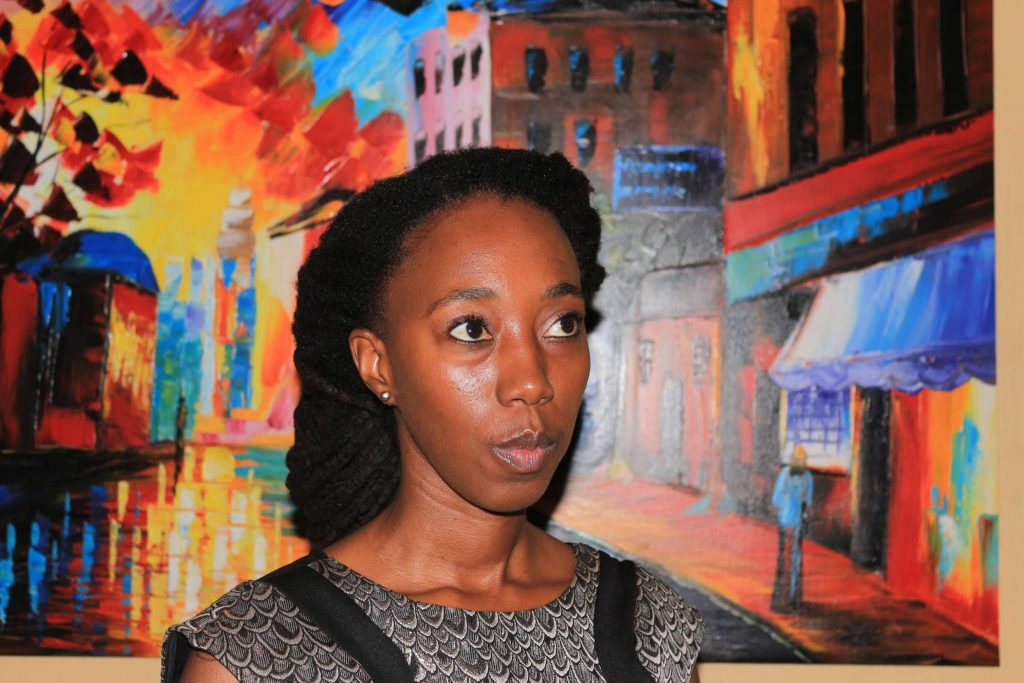
Global black hair care is on the rise. In South Africa, the black hair care industry was estimated to be valued at R9.7 billion a year in 2015. Budding entrepreneur Thokozile Mangwiro believes that Africa is producing the most beautiful, natural and organic skin and hair care products. Her brand, Nyla is reaching for a share in that billion rand market by creating products using marula oil, an indigenous oil to southern Africa. What is the natural hair scene like in Johannesburg? What sort of events do you have? The natural hair movement in Johannesburg is absolutely inspiring. There is a lot of consciousness and awareness about the movement from chemically laden products towards greener natural hair care. We are currently in the midst of the South African winter which can be very harsh to the skin and hair. Protective styling is the order of the day. Hair-line friendly plaits and wigs are definitely in. Naturals here also have “Hair stokvels”, where we get together to share and educate each other about caring for and growing our natural hair. Hair stokvels also have natural hair care product stalls and guest speakers. There are other events like the “For Black Girls Only” event, which does not set out to exclude other races, brings together all African women from all walks of like to celebrate just who we are. Why does your brand focus on marula oil? We believe that marula oil the secret to timeless hair and skin nourishment. This magical oil is obtained from the core of the marula fruit. Marula oil is indigenous to Southern Africa, yet clientele have never heard of it and it’s rich properties. The Tsonga women of South Africa and Mozambique have used this oil as a moisturiser and a massage oil on babies for years. Marula oil has protected the African skin and hair against harsh and dry, hot and humid weather conditions. It’s multi-purpose, used for personal care and is safe for both babies and adults. Marula oil contains properties that create a high performing cosmetic oil that mimics the skin’s outer layer, regenerates the skin cells, thus promoting a youthful looking, well-nourished healthy skin. It’s a light weight oil, meaning it quickly absorbs into the skin and hair, while leaving a non-greasy silky smooth feeling. It is gentle enough to use alone or with any lotions and facial skin creams. Do you only create hair care products? We focus solely on natural hair with Nilotiqa Hair Care which is formulated for dry and damaged hair. Nyla Marula Beauty is our luxury natural and organic brand that caters for all types of skin and hair care. Our Marula Evolution Collection showcases pure Marula oil, fused it with various natural botanical and organic ingredients to create the most luxurious products to nourish skin and hair. Because the products are organic and natural, they are suitable for all skin types. Our product line consists of a deep replenishing co-washing conditioner, deep moisturizing butter, detangling cream and nourishing scalp and hair oil. Our natural products are formulated with high-quality nourishing ingredients such as shea butter, coconut oil, castor oil and avocado oil. We avoid artificial sourcing of ingredients and our products do not contain petroleum, lanolin, parabens, phthalates, or artificial colors. What tools do you use to grow your business? Firstly, our business is incubated. This has given the business organizational, financial and operational structure. Secondly, we ensure that we collaborate with cosmetic organisations that have high standards for compliance. This forces us to look into how compliant we are and ensure we distribute high quality products locally and internationally. Lastly, we purposely use social media to reach out to clients that are not only local, but also international. What is your favourite style for a bad hair day? Bad hair days for me means seriously dry hair. I first try to get moisture back in my hair using my Nilotiqua Deep Moisture Butter. I am lucky enough to have long dreadlocks and so after adding the butter, I can just tie my hair up into a bun. I am also huge fan of head wraps, known as doek in South Africa. Those can get you by for a week. If you’d like to share your story with She Leads Africa, let us know more about you and your story here.
Ngozi Opara: Breaking through the $500B black hair market
Ngozi Opara started Heat Free Hair to provide women with high quality protective styling options that wouldn’t damage their natural hair. The Washington D.C. based company, launched in 2012, specializes in 100% virgin hair extensions designed to perfectly match one’s natural hair texture and curl pattern. Heat Free Hair was a pioneer in the natural hair extensions market and quickly carved out a niche in the $500b black hair market. She Leads Africa quickly caught up with Ngozi to learn more about the entrepreneur who didn’t just create a brand, but a movement. Who is Ngozi Opara? I graduated from North Carolina A&T State University with a degree in Finance and Accounting. Keeping with my field of study, I worked as a financial analyst once I graduated although I always knew I wanted to be an entrepreneur. So I opened up a small hair studio in DC to tend to clients after work each day. Prior to opening up my own business, I worked for eight different entrepreneurs to gain experience in business ownership and management. My interest and passion for the world of natural hair sparked from being natural myself, as well as working as a manager for natural hair care industry lead, Carol’s Daughter. What inspired you to start Heat Free Hair? I owned a hair studio in Washington, DC. For a while back in 2011, 90% of my customers were using extensions to protect and grow out their hair. A majority of them also wanted to transition to free their hair of chemical processing and wanted to be natural. When I noticed that during their transition with extensions they were reaching tremendous success in hair growth, but inherently experiencing breakage from heat on the portion of their hair left out, I felt like I was becoming an agent in one of the many issues surrounding black hair care, breakage. I started thinking that there had to be some type of way for women to wear extensions as their protective style of choice, while also protecting all of their hair. Thus, the initial idea for Heat Free Hair was born. Once you decided that you are going to embark on the entrepreneurial journey, what steps did you take? I started to really save up for the launch of my business and budget my living expenses. I did this by keeping my personal expenses at a minimum while I was trying to reach my goal. To get in the right mindset and gain motivation, I started to read a lot of success books and attend different conferences in order to learn, as well as to network with like-minded people. I used my savings from my finance job to launch the business & lived completely off of the money I earned doing hair. How do you prioritize what to spend the money raised on? At first I needed people to believe in something they hadn’t seen so I invested in good images of the product and a website. I didn’t have enough to fully stock the product so I initially offered it for preorder and eventually kept investing back into the business’ inventory.” What are the marketing tools/strategies that you use to promote your business? Word of mouth is the greatest marketing tool. Organic marketing has worked really well for us as well as influencer marketing and social media. What is the one thing you know now that you wish you knew when Heat Free Hair launched? There really isn’t anything I would go back and tell myself. I really do believe I was where I needed to be in life when I needed to be there. I learned the right lessons at the right time and because of that, I can stand comfortably and happily where I am today. Obstacles along the road I traveled served as building blocks and I’m truly thankful for my journey and the development of my business.
